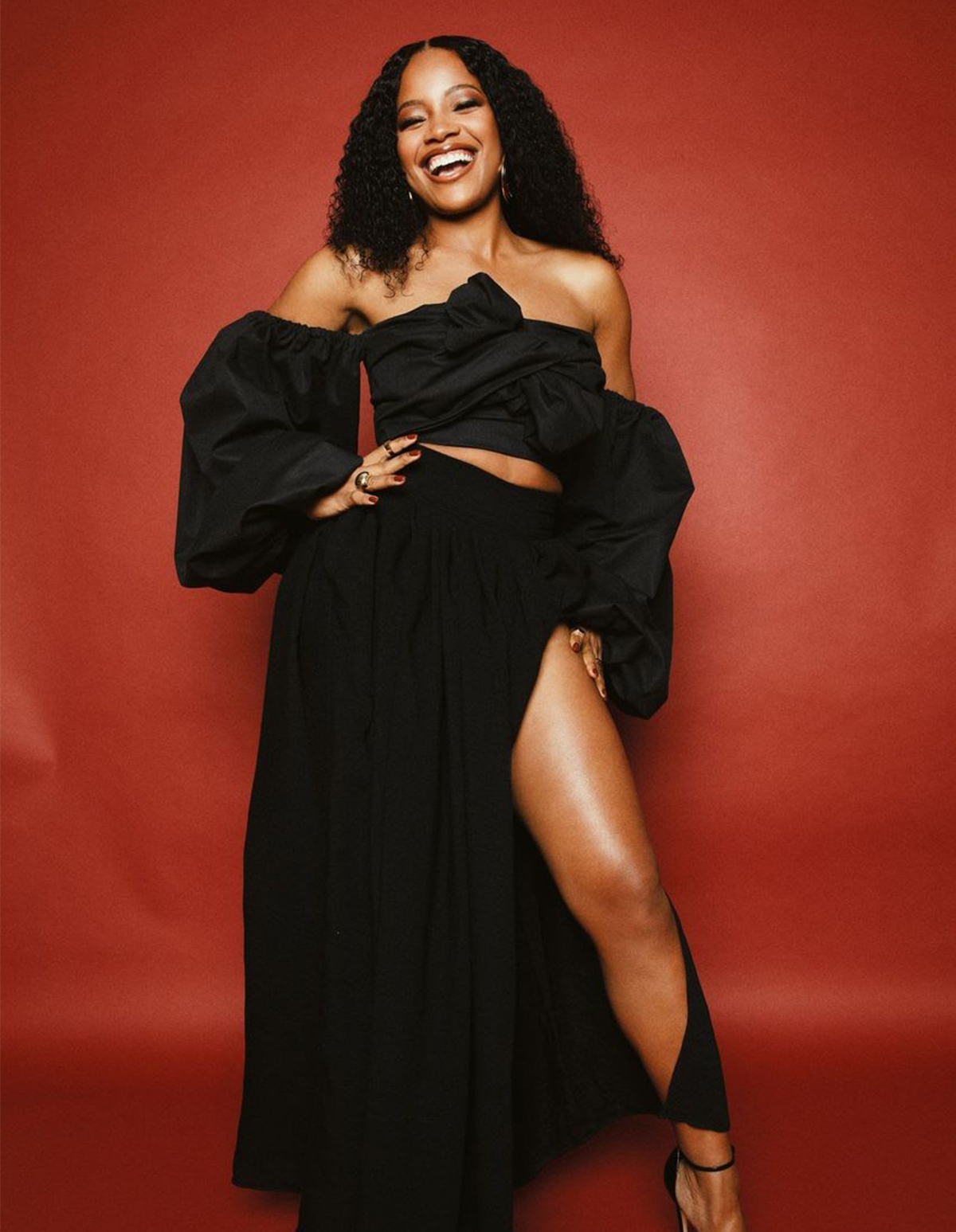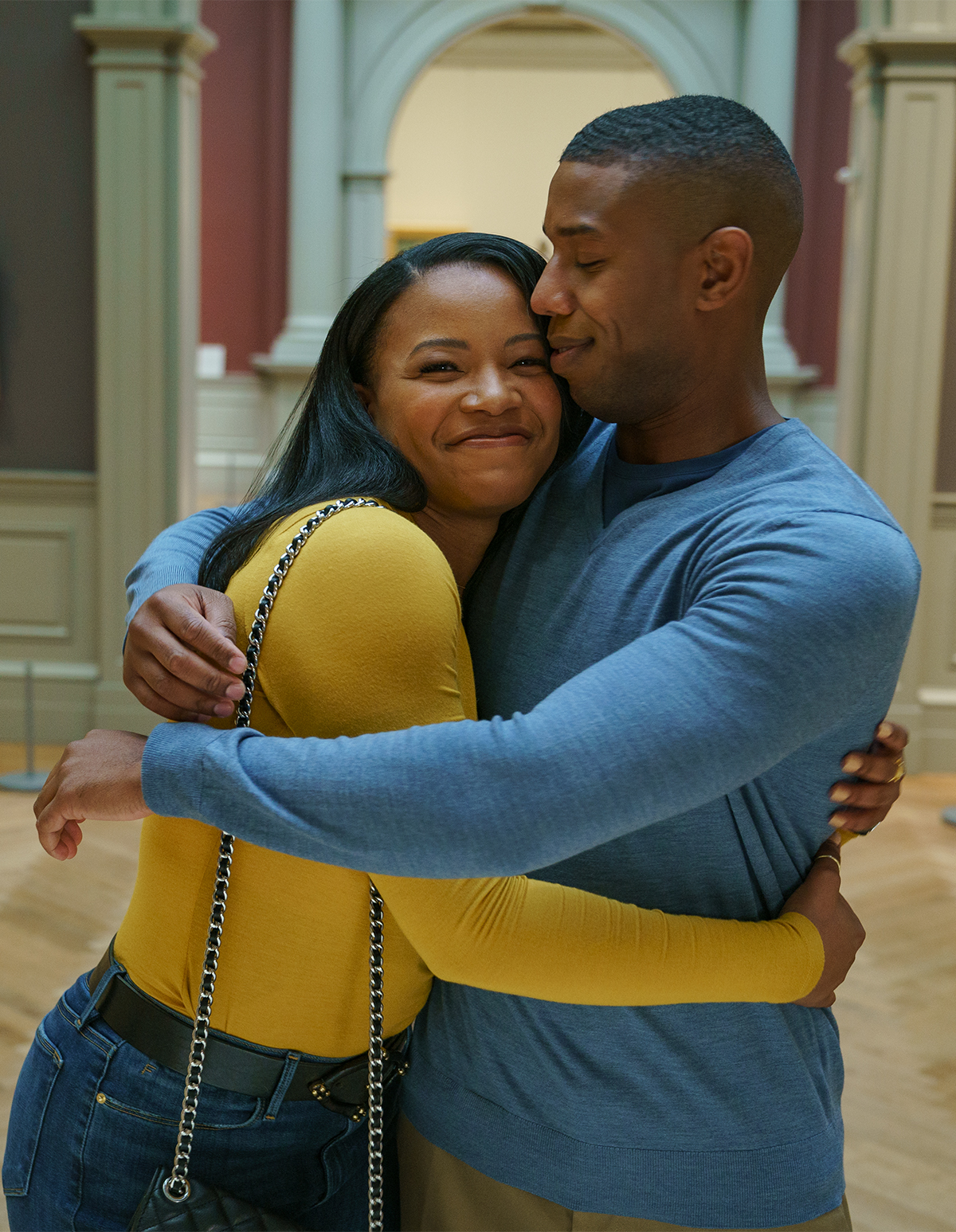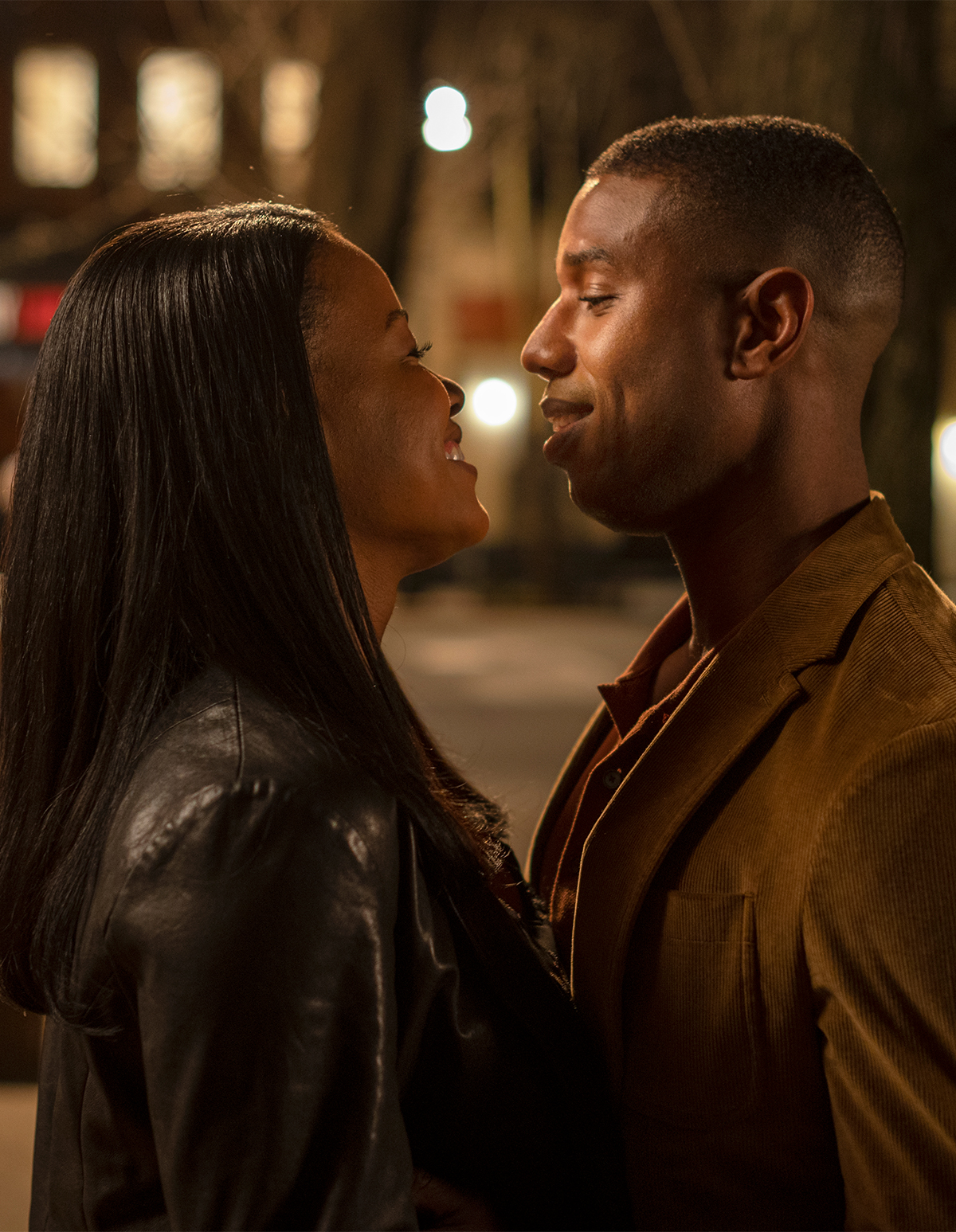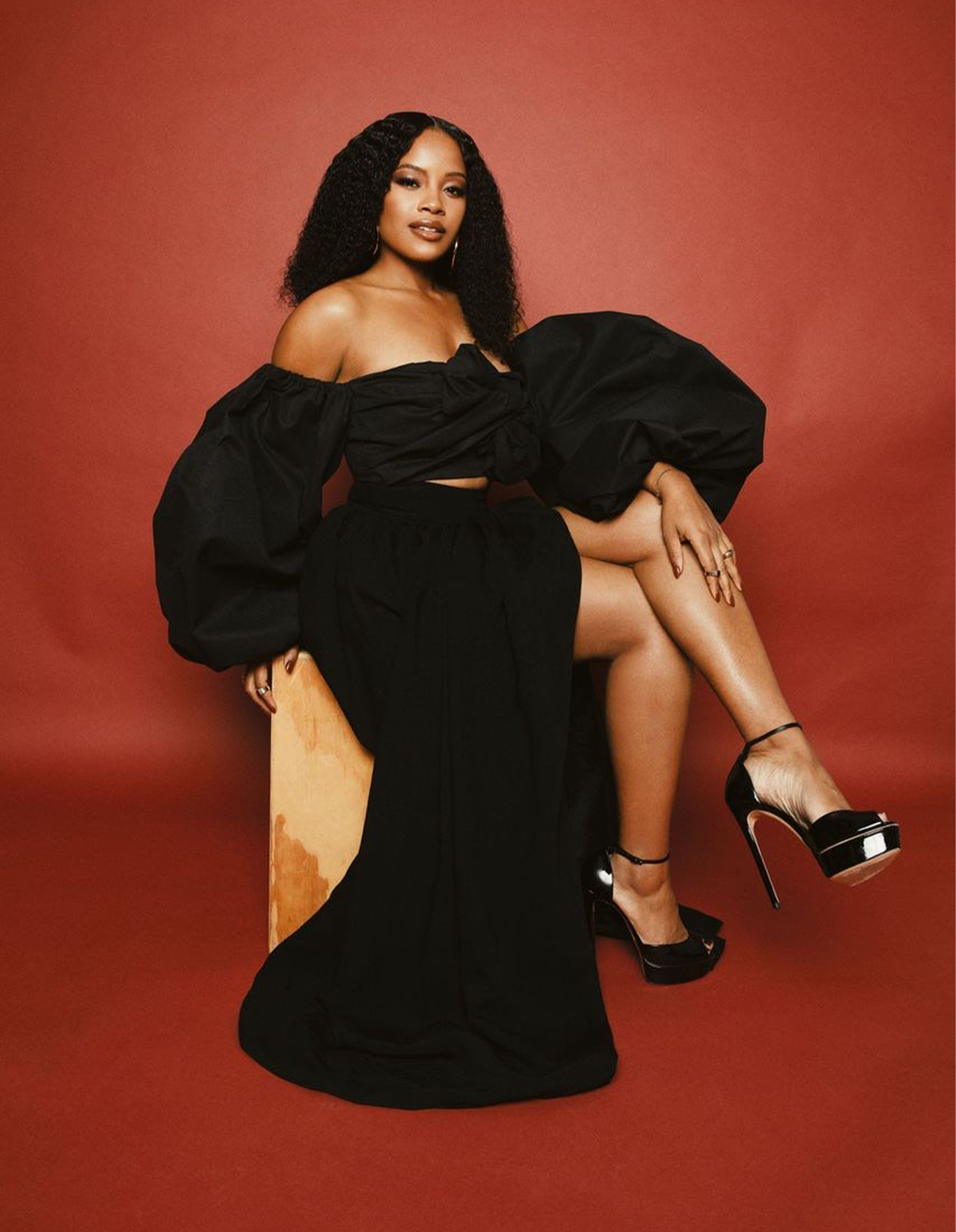Chanté Adams is on the verge of a major moment. I can feel it. She has a romantic drama hitting theaters Christmas Day, is currently in the thick of rehearsals for the Broadway show Skeleton Crew, and is starring in the highly anticipated reimagining of A League of Their Own coming next year. To say we’ll be hearing Adams’s name a lot in the coming weeks, months, and year even would be an understatement. It’s an exciting time for the 26-year-old.
Adams and I find ourselves chatting over Zoom early on a Tuesday morning. It’s a brief moment of calm for the actress, who is perched on her bed sipping tea before her busy day begins. We quickly get to talking about her new film, A Journal for Jordan. The project, directed by Denzel Washington and starring Michael B. Jordan, is based on the memoir of the same name by Dana Canedy. Addressed to her then infant son, the emotional story recounts Canedy’s once-in-a-lifetime love with Jordan’s father, U.S. Army 1st Sgt. Charles Monroe King, while including notes of fatherly advice penned by King during his deployment in Iraq, where he sadly lost his life. Adams plays Dana in the film, and her performance is nothing short of breathtaking. When I’m speaking with her, it’s clear A Journal for Jordan holds special meaning. She lights up while talking about the extraordinary relationship between Dana and Charles, the close bond she developed with Canedy (“She is like my big sister”) while filming, and working with screen legend Washington. Though the film documents an unimaginable loss, at its core, it’s about a beautiful love story, and Adams hopes audiences walk away with the courage to fall hard and fast in love.
Ahead, I talk to the rising star about the emotional journey of bringing Dana to life on-screen, her big year ahead, and finding joy in telling the stories of dynamic and layered Black women.

A Journal for Jordan is a beautiful film based on the real-life love story of Dana Canedy and U.S. Army 1st Sgt. Charles Monroe King. Can you tell me how you were first introduced to the project?
Last February of 2020, right before the pandemic hit, I was at this art opening, and my agent was like, “There is going to be this movie made. Michael B. Jordan is starring in it, and Denzel Washington is directing it. I want you to audition.” I literally was like, “Okay.” I have gotten close to really big things over the past couple of years, and it was like, “Oh, we’re going this way because of this. We’re going this way because of that.” And of course, I want to audition, absolutely. I just wasn’t like, “Oh my god, yes! When is the audition? Send me the self-tape.” Then, all hell broke loose in March 2020, and I didn’t hear a word about it again until August. My agent called, and she was like, “Remember that movie I told you about at the art gallery?” And I was like, “Oh yeah, the one with Michael B. Jordan and Denzel,” and she was like, “Yeah, it’s time to self-tape for that.” The script was shrouded in secrecy, so I knew absolutely nothing. And I wasn’t going to read the book because it was my self-tape. I was going to send that off, and I just knew it was going to go off into the wind, and I would never hear anything. But three weeks later, I got this email that Denzel wants to meet with me, and I was like, “Okay, over Zoom?” And they were like, “No, in person.” I was like, “Hold on. My first audition back in a pandemic is just going to be with Denzel? I don’t get a warm-up?” Right before the pandemic was hitting, I was filming the pilot of A League of Their Own, so I hadn’t auditioned in person in almost a year. So my first audition back, in the pandemic, was going to just be me and Denzel and the casting director. That went amazing, and I thought, “I’m probably not going to get the role, but I feel really good about it, and I could tell Denzel was interested, and that’s all that matters.” And then I get another email. He wants me to come back and chemistry read with Michael. And then I was like, “Oh, okay, this might be real.” I did that, and we had a really great session, and then they called me back again. I had another audition. This was the longest audition process I had ever been through, but it was the most special because at the end of my last audition, Denzel told me in the room that I got the part.
What a wild ride! Do you usually walk out of an audition thinking nothing will come of it, or have you had ones that you felt really confident about?
I’ve never walked out of an audition and been like, “I’m getting this role.” I’ve walked out of auditions and been like, “I felt really good about this. I feel like me and whoever I was reading with really connected.” I never walk out of there like it’s mine in order to preserve my mental health. I also have a “let go and let God” mentality. So I know after I leave the audition room my work for that day is done, and I can’t stress over “Did I get the part? What’s happening?” I can’t do that anymore. I used to, but that’s eating minutes out of my day, and I don’t have the time.

Dana Canedy is a pretty incredible woman. She was a senior editor at The New York Times when she wrote A Journal for Jordan; is the co-author of the series How Race Is Lived in America, which won the Pulitzer Prize; and is now the first African American to head a major publishing imprint at Simon & Schuster. Can you tell me about your relationship with her during filming and now?
Once I got the role and they connected me with her, she was like, “I’m an open book. Ask any question you want.” So toward the beginning, I would call her maybe once a month or every other week and just have a list of questions. I would interview her for an hour. A really fun fact about Dana and Charles that not many people know (it’s in her book) is that her birthday is June 8, and his birthday is June 10, and they were going to get married on June 9, so those three days are really special. So we would talk about that and just all types of things. Like you said, she is one of the most decorated and successful women that I personally know, but when you have a conversation with her, all she wants to talk about is Jordan and Charles. At the end of the day, she is mom, first and foremost, and that is her biggest job. When I would have hard scenes to film, I would call her the night before. When I had to film this scene where Dana hears about Charles’s death, I called her the night before, and she walked me through it, which I was so appreciative of because that’s hard. Even 15 or 16 years later, she’s still dealing with grief. Grief doesn’t just go away. It’s a process you have to work through. But she was willing and open to share that with me, of what that felt like and how that was for her. And now, she is like my big sister. I think I talk to her every day at this point. I just love her.
Were you nervous for Dana to see your portrayal of her?
Hell yeah! I was shaking in my boots. And this is what I didn’t want: One of my producers texted me and was like, “Dana is watching the movie this weekend.” It was a couple months ago, and I was like, “Why would you do that?” So of course, that whole weekend, I was like “Dana hasn’t called me. She hated it.” And then finally she called me, and I was about to walk out the door and go to work—I was filming A League of Their Own—and I walked right back in my door and was like, “Hello! How was it?!” And she was like, “There is only one thing that I have a problem with,” and I was like, “What? What was wrong?” And she was like, “I’m not going to be able to get in touch with you after this movie. I’m so excited for you and your career. You just did such an amazing job.” Hearing those words, I was like, “Okay, nothing else matters.” I hope that the world loves this movie. I truly do. But she does, and that was important to me.
What are some of the things that you really admire about Dana and Charles’s relationship?
Probably the fact that they are two different people. Charles is very type A. Dana is more like go with the flow but also likes to be in charge. I don’t know, but somehow as soon as they meet… and you’ll see it in the movie, and she describes it in the book. It’s just like something that clicks. It’s like this magnetic energy, and they can’t stay away from each other. But it’s just the fact that they chose to love each other despite their differences, and they came together and created the most beautiful thing. Jordan is so amazing. He is the smartest kid I know.

You star opposite Michael B. Jordan, who is a producer on the film but also an excellent leading man. What approach did the two of you take to build that on-screen chemistry?
Denzel did something that I had never experienced on any film that I’ve been on before. He made us come to New York three weeks early so we could rehearse every day. We went into a rehearsal room as if we were doing theater. We practiced our blocking and went over the script and our lines together. Usually in film and TV, you show up on the first day, and boom, you got to have everything ready. That’s what we do chemistry reads for. Everything has to be good. But I think the fact that Denzel made us come early and we really took our time working through the script before the first camera was even set up really aided in me and Michael’s chemistry. By the time it was time to film, we were already so comfortable as Dana and Charles. It made it effortless.
Denzel Washington is a screen legend. What did you learn from him as your leader on this project?
People always ask me this, and I’m like, “I worked with the master of my craft for four months.” I learned something new every day. I guess, off the top of my head today, one of the biggest things I learned was the importance of setting a path for a new generation. Denzel has had the rights to do this movie for, I think, 13 or 15 years or something like that. And he held it until he felt like it was the right time. And the fact that he was like, “I’m going to give this opportunity to these younger actors because it’s now their time, and it’s my duty, and it’s my job to do that,” that was really special because he could have done the movie back in like 2006. He could have been Charles. And the fact that he wanted me for this part, I have been in a couple of movies. I think I’m pretty okay at my job. But for his first movie that he is directing, that he is not starring in, he chose me, and I think that speaks to how legends, because he is one, how legends and icons get to a point where it’s like, “Okay, it’s time for us not to pass the torch but to share it, the torch.” That’s exactly what he did with this.
The film hops back and forth between the more joyful moments of Dana and Charles’s relationship and her painful mourning period following his death. What did you pull from when working on those more emotional scenes?
Dana was it. I relied heavily on Dana and just my own spirituality. I talk about God all the time because that is something that is really important in my life. It was a lot of prayer because putting myself in those shoes can be difficult and emotionally draining, and having to do it over and over and over again, I think people forget when they see a scene that it took hours to film. I have to do that same thing when the camera is here, when the camera is there, when the camera is behind me, and then after that’s over, I have to go do another scene where I’m probably extremely happy. It’s emotionally draining, so I really leaned on God and my spirituality for that side of it, but when it comes to actually doing the part, it was Dana, hands down. By the time we started filming, me and Dana had gotten so close and formed such a strong relationship. Just the thought of her being hurt by anything would make me crumble. So she would talk about what that felt like, what grief felt like at the time also having a newborn. She was navigating the saddest moment and the happiest moment of her life at the exact same time, and that is a crazy path trying to find that balance. At 6 a.m., you are crying your eyes out in the bathroom, and then at 7 a.m., your son just took his first steps. How do you navigate through that? So it was Dana.
I’m sure there were a lot of heavy days filming, but can you recall a particularly joyful day on set?
We shot at The Met. They shut The Met down, and we got to shoot inside and outside, and that was super fun. There is this scene (it’s not in the movie, but you can see it in the trailer) where I am strutting across the street. And usually, they would put music in post, but Denzel had music blasting while I was strutting, so onlookers and people were just like, “What is she doing?” I would just do it over and over again. It was so funny because Dana was there that day, and she would come up to me and be like, “Girl, I have never walked like that.”
The film comes out on Christmas Day. It’s definitely a tearjerker, but what do you hope audiences take away from this film?
I hope that audiences see our movie and are not afraid to fall in love. People are getting prepared for heartbreak with our movie, but that’s not the moral of the story. The moral of the story is to love anyway and to love the people while they are here. So I hope that’s what they take away from it.

Right now, you are in rehearsals for the Broadway show Skeleton Crew. The production marks your return to the stage following your performance in Ma Rainey’s Black Bottom at Two River Theatre. What do you love most about the theater side of acting?
The connection to the audience. I love feeling the energy and just the vibes. You can have no energy at all and be like, “I don’t know how I’m going to make it through this show,” and you get on stage, and you hear the audience reacting to what you are doing, and you can just feel their energy, and that will make you snap out of it immediately. So that’s definitely what I’ve missed. It’s just been me and a camera for a really long time. I’m excited to get an audience back.
You also have the highly anticipated TV reimagining of A League of Their Own coming next year. What can you tell us about this iteration of the 1992 film classic and your character Maxine “Max” Chapman?
Well, I can tell you that we are digging a lot deeper into the actual time period and what that was like. And a little bit about my character, Maxine represents the forgotten voice out of the first movie. There is one scene with a Black woman in A League of Their Own where she catches the ball and throws it, and that’s it. We never see her again. And so Maxine kind of represents, What was the story of that woman? She’s a Black queer woman in the 1940s that just wants to be free and play baseball, and that is easy to say now in 2021, but how hard was that for a woman in the 1940s? That is what half our series is exploring, because we also have our dynamic Peaches that will be bringing all the nostalgia. It’s going to be a really good show.
You clearly have a lot of exciting things in the works. What are you looking forward to accomplishing in the next couple of years of your career?
You know, my answer changes all the time. I feel really fortunate these last couple of years with the people I’ve been able to work with and the projects I’ve been able to work on. I just want to continue to tell stories of complex and dynamic and layered Black women. That’s always the goal, and that’s been my passion. But I also want to expand and try different genres. My goal at the end of the day is to be labeled a transformational actor. I am ready to dip my toe in a couple of different things.
A Journal for Jordan is in theaters Christmas Day.
Photographer: Juan Veloz
Stylist: Jennifer Austin
Hairstylist: Sean Fears
Makeup Artist: Stephen Moleski
